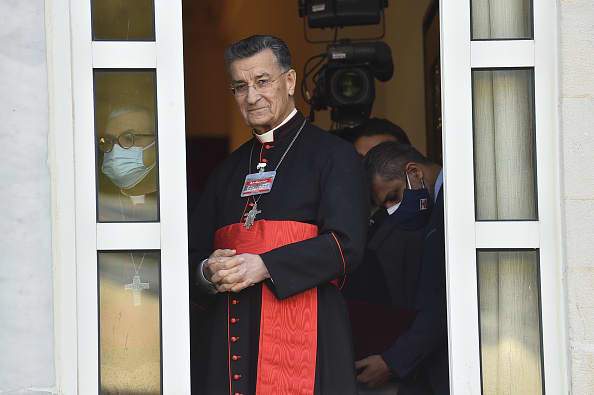Lebanon’s most senior Christian cleric, Patriarch Bechara Boutros Al-Rahi, called for a meeting with Iranian-backed political and paramilitary group Hezbollah as he urged neutrality in regional conflicts to save the beleaguered Middle Eastern country from further chaos.
“I assert that there has been no sincere and clear position with regards to neutrality from Hezbollah,” Al-Rahi told CNBC’s Hadley Gamble in Beirut. “And I’m waiting and I call on them to a meeting here where we talk about neutrality and all its aspects, because neutrality is in the interest of all Lebanese and first Hezbollah. Because they are Lebanese as well. So neutrality is in the interest of all.”
Lebanon’s Hezbollah, which is Shi’ite Muslim, remains the most powerful political party and militant group in the country. Acting as a proxy group for Iran, it is blamed by many Lebanese and foreign governments for stoking sectarian tensions and bringing violence into Lebanon.
The small Mediterranean country of 6 million has been gripped by spiraling crisis and soaring poverty since late 2019 owing to financial meltdown, economic mismanagement and government corruption. Its feuding sectarian leaders have failed to form a government, leaving the country without effective leadership since its last prime minister stepped down after a deadly explosion in August 2020 tore through the capital Beirut, killing hundreds and displacing thousands.
‘Today it is hell’
Many Lebanese say that the scale of the current crisis, which has seen the country’s currency lose practically all of its value, is far worse than Lebanon’s bloody civil war of 1975-1990 and that the coronavirus pandemic, which has overwhelmed its health care system, is the least of their worries.
While opponents of Hezbollah often describe the country as held hostage by the group, they also acknowledge that confronting the heavily-armed organization, which also controls Beirut’s port and airport, could result in a return to arms and renewed civil war.
And Hezbollah, whose allegiance is to Tehran rather than the Lebanese constitution, does represent a large part of Lebanon’s Shiite community.
“I haven’t heard yet directly from Hezbollah if he is against or with neutrality,” the Patriarch said. “If he says ‘I’m against,’ I ask him are you against the sovereignty of Lebanon, you don’t want Lebanon to be a sovereign state on its territory? If it’s true you don’t want neutrality, you don’t want Lebanon to fulfil its role.”
“Lebanon used to be (the) Switzerland of the Middle East — today it is hell, like the president once said,” Al-Rahi said. “This is not something we can be proud of. That’s why we badly regret.”
The Patriarch spoke of a “mutual defense strategy” proposed by previous presidents but that never materialized; something that would have empowered unified foreign policy actions by the Lebanese state rather than sectarian groups.
“Hezbollah shouldn’t remain free in using arms whenever and wherever he wants,” he said. “And shouldn’t be capable of deciding wars in Israel, in Syria, in Iraq, in Yemen, with disregard to the government, the president and the parliament. So the idea of the mutual defense strategy was raised but it wasn’t realized.”
“Hezbollah like the army or any other army in the world is not entitled to make a decision or to decide to go into war or peace, the state is the one which decides,” he added.
“But the cause of Hezbollah and the arms is much bigger than Lebanon and has to be addressed on the international level.”
The Patriarch added that he had met once with the group previously, but “we discussed issues that don’t have anything to do with arms, because this is something that is beyond us.”
When regional powers are at odds, Lebanon gets caught in the crosshairs. This played out in 2005, when then-prime minister Rafik Hariri was assassinated in a plot believed to be the work of Hezbollah and the Syrian government.
Lebanon has long been the ground where larger powers’ proxy battles for regional influence play out. It’s home to 18 different religious communities thanks to arbitrary border-drawing by French generals, who established the state in 1926.
Its unique consensus government, tailored to deal with a diverse population, rests on a power-sharing structure whereby the prime minister, president and speaker of the house must come from the country’s three largest religious groups: Sunni, Maronite Christian and Shia, respectively. Regional powers, therefore, often exert influence in the country through these various groups.
‘Iran is the source’
The Patriarch described Lebanon as having asked the U.S. “not to make Lebanon a negotiating card between the U.S. and Iran when they want to settle the nuclear issue,” referring to Tehran’s controversial nuclear program.
“The issue of arms should also be addressed with Iran because Iran is the source,” he added, directly calling out Iran. “And it’s very well known that Hezbollah (is) an Iranian military force in Lebanon to combat Israel. Why should they combat Israel from Lebanon, if you want to fight Israel why do you want to use the Lebanese territory?”
Hezbollah and Israel went to war in 2006 in a 34-day conflict that saw Israeli forces launch an offensive against Lebanon in response to Hezbollah rocket attacks and the killing of Israeli soldiers. There have been back and forth strikes and assassinations in the years since.
“We want an international conference and also we want the security council to take resolutions around the arms issue and the militias that exist in Lebanon. And around the issue of Lebanon extending its sovereignty on all the Lebanese territory,” Al-Rahi said. His call for a U.N.-sponsored international conference has been slammed by Hezbollah chief Hassan Nasrallah, who previously argued it would enable foreign interference.
The issue of Lebanon’s sovereignty over its full territory, put forward at the U.N. in previous resolutions, should be addressed on a multilateral level, the Patriarch stressed — “not on the internal Lebanese level.”
